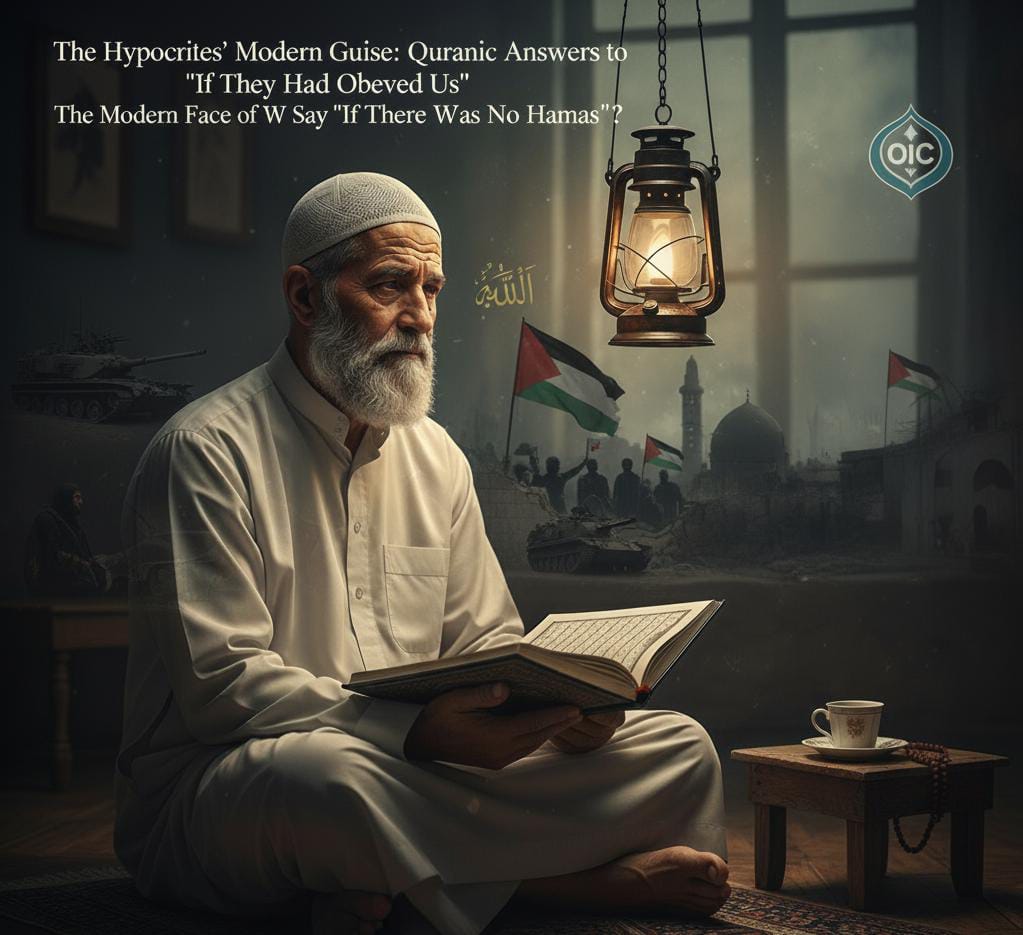Introduction: The Timeless Wisdom of the Qur’an
In today’s world of confusion and chaos, we often hear voices within the Muslim Ummah echoing sentiments like:
“If Hamas didn’t exist, Palestine would be at peace.”
“If October 7th hadn’t happened, there wouldn’t be so much destruction.”
“If Mullah Omar had handed over Osama bin Laden, Afghanistan would have been spared war.”
These statements sound reasonable to some, but the Qur’an already addressed this mentality more than 1400 years ago — exposing the hypocrisy behind such thinking.
Today, during our “Hour of Response (Sa’at al-Istijabah)” class, we read a verse from Surah Aal-e-Imran that gives a divine answer to such doubts.
Quranic Response to the Hypocrites: Surah Aal-e-Imran (3:168)
“[Those are] the ones who said about their brothers while sitting [at home], ‘If they had obeyed us, they would not have been killed.’ Say, [O Muhammad], ‘Then prevent death from yourselves, if you should be truthful.’”
(Surah Aal-e-Imran, Verse 168)
This verse exposes a hypocritical mindset — those who criticize the Mujahideen and martyrs from the comfort of their homes, claiming that if they had listened and stayed back, they wouldn’t have died.
But Allah commands the Prophet ﷺ to challenge them: “If you are truthful, then save yourselves from death!”
The Qur’an’s answer is eternal — life and death are in Allah’s hands, not in avoiding struggle or submission.
Modern Echoes of Hypocrisy
Today, similar arguments resurface in our societies:
- “If October 7th hadn’t happened, there would be peace.”
- “If there was no Hamas, negotiations would succeed.”
- “If the Taliban had compromised, Afghanistan would be prosperous.”
Such statements echo the same spirit of weakness and defeatism that the Qur’an condemns.
Even leaders and intellectuals repeat these words, forgetting that sacrificing dignity for false peace never brings security.
The Rulers’ Accountability
It’s especially tragic when these words come not from ordinary citizens but from the rulers of Muslim nations like Turkey, Egypt, and Pakistan — countries with powerful armies and resources.
Instead of supporting the oppressed and upholding justice, they adopt narratives of appeasement, claiming:
“We must eliminate the Jihadists and Islamists, or we’ll face the fate of Libya or Egypt.”
But Islam does not grant rulers the luxury of neutrality in the face of oppression. Their silence or compromise becomes complicity.
Misinterpretation of Quranic Verses
Many misuse verses like:
“And turmoil (fitnah) is worse than killing.” (Surah Al-Baqarah 2:191)
and
“Do not throw yourselves into destruction with your own hands.” (Surah Al-Baqarah 2:195)
These are contextual verses — meant to guide believers not to abandon the struggle for justice, but to remind them that submitting to oppression is the true destruction.
The Choice: Jihad or Hijrah
Even if one cannot actively fight, the Prophet ﷺ instructed believers to migrate (Hijrah) from lands where they cannot practice their faith. There is no permission for complacency in the face of tyranny.
Meanwhile, Muslim rulers invite foreign armies and give bases to non-Muslims, claiming to protect against threats like Iran — while it is Israel and its allies who continue the aggression.
The Doha OIC Summit: A Symbol of Inaction
The OIC Summit in Doha (September 15, 2025) exposed the powerlessness of Muslim leadership:
- No real steps for Palestine.
- Continued normalization with Israel.
- Ongoing trade with aggressors.
- Silence over the disarmament of Palestinian camps in Lebanon.
Our words and condemnations mean nothing if our actions aid the enemies and abandon the oppressed.
The Hadith About the Army of the Mahdi (A.S.)
The Prophet ﷺ foretold three kinds of people in the army of Imam Mahdi (A.S.):
- Those who surrender without fighting — Allah will not accept their repentance.
- Those who fight and are martyred — the best of martyrs.
- Those whom Allah grants victory — who will witness the rise of Islam’s glory.
Which group do we belong to?
Call to Action: Dua and Istighfar
We must begin with guidance and repentance (Istighfar). Like the people of Prophet Yunus (A.S.), only sincere repentance can lift the collective punishment.
If we do not recognize our sins — silence, compromise, and apathy — how will Allah accept our repentance?
Let us recite:
“Our Lord, let not our hearts deviate after You have guided us, and grant us mercy from Yourself. Indeed, You are the Bestower.” (Aal-e-Imran 3:8)
“Guide us to the straight path, the path of those upon whom You have bestowed favor — not of those who have evoked Your anger, nor of those who are astray.” (Surah Al-Fatihah)
Conclusion: Reflect Before It’s Too Late
Once we thought the “Maghdoob” (those under Allah’s anger) and “Dallin” (those astray) were Jews and Christians.
But today, their traits appear within the Ummah — among Muslims who abandon justice, distort scripture, and betray their brothers.
Let us pray that Allah does not make us among them, but among those who stand firm with truth, sacrifice, and faith.


